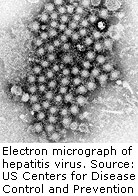Lab tests suggest over-the-counter antihistamine could offer alternative to pricey new drugs
THURSDAY, April 9, 2015 (HealthDay News) — Preliminary lab research suggests the antihistamine chlorcyclizine HCl that costs about 50 cents a pill has the potential to treat hepatitis C, offering an alternative to the newer medications that can sell for $1,000 a dose. The study appears in the April 8 issue of Science Translational Medicine.
It’s too early to know if the antihistamine chlorcyclizine HCI will work in people as a treatment for hepatitis C. Still, the new research suggests that “the drug blocks the virus getting into cells and is different from the current hepatitis C drugs, which block viral replication,” study coauthor T. Jake Liang, M.D., a senior investigator with the U.S. National Institute of Diabetes and Digestive and Kidney Diseases, told HealthDay. Moreover, “this drug complements the existing hepatitis C drugs and can be used in combination with them,” Liang added.
Liang and his team have tried to determine if new uses of existing drugs might work to treat the disease. In this study, they grafted human liver cells into mice to test the allergy drug. An over-the-counter antihistamine, chlorcyclizine HCl, costs $16.98 for 30 pills when sold under the brand name Ahist. Chlorcyclizine has been around for decades but is not widely used. But the researchers found that the drug appears to prevent an early stage of infection with hepatitis C. The drug could be used in many hepatitis C patients, Liang said, and could help prevent re-infection in patients who undergo liver transplantation.
The research is early, and a number of challenges remain, however. For one thing, “we would have to use the currently accepted dosing for any clinical trial, because the drug at high doses may have significant side effects, such as drowsiness,” Liang said. “It is possible that the current dosing may not be active against hepatitis C in people.”
Copyright © 2015 HealthDay. All rights reserved.








